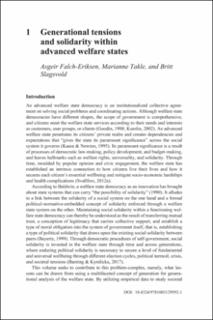Generational tensions and solidarity within advanced welfare states
Chapter
Published version
Permanent lenke
https://hdl.handle.net/11250/2787091Utgivelsesdato
2021-09-13Metadata
Vis full innførselSamlinger
Originalversjon
https://doi.org/10.4324/9781003129592Sammendrag
An advanced welfare state democracy is an institutionalized collective agreement on solving social problems and coordinating actions. Although welfare state democracies have different shapes, the scope of government is comprehensive, and citizens meet the welfare state services according to their needs and interests as customers, user groups, or clients (Goodin, 1988; Kumlin, 2002). An advanced welfare state penetrates its citizens’ private realm and creates dependencies and expectations that “gives the state its paramount significance” across the social system it governs (Kaase & Newton, 1995). Its paramount significance is a result of processes of democratic law-making, policy development, and budget-making, and leaves hallmarks such as welfare rights, universality, and solidarity. Through time, moulded by popular opinion and civic engagement, the welfare state has established an intrinsic connection to how citizens live their lives and how it secures each citizen’s essential wellbeing and mitigate socio-economic hardships and health complications (Svallfors, 2012a).

